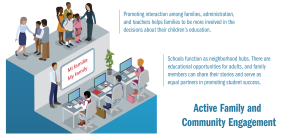Introduction: Enter the world of education where humanity takes center stage. Join Dr. Rachel Carter, a passionate educator committed to embracing humanity in learning. Dr. Carter believes that at the heart of education lies the profound connection between educators and students, nurturing not just academic growth but the holistic development of individuals. Heart of Education:
Introduction:
Enter the world of education where humanity takes center stage. Join Dr. Rachel Carter, a passionate educator committed to embracing humanity in learning. Dr. Carter believes that at the heart of education lies the profound connection between educators and students, nurturing not just academic growth but the holistic development of individuals.
Heart of Education: Nurturing the Whole Child:
Education goes beyond academics; it encompasses the holistic development of students. By nurturing intellectual, emotional, social, and physical well-being, educators lay the foundation for lifelong learning and personal fulfillment.
The Power of Human Connection in Learning:

Image by:eduauraa.com
Human connection is at the heart of effective teaching and learning. When educators establish authentic relationships with students based on trust, respect, and empathy, they create a supportive environment where learning flourishes.
Heart of Education A Catalyst for Academic
Empathy is a foundational skill that fosters both academic success and emotional well-being. By understanding and responding to students’ needs, educators create a nurturing learning environment where every individual feels valued and supported.
Heart of Education Creating Safe and Inclusive Learning Environments:
Safe and inclusive learning environments are essential for student success. By promoting respect, acceptance, and belonging, educators create spaces where every student can thrive academically, socially, and emotionally.
Cultivating Character and Values Heart of Education
Character education instills essential values such as integrity, empathy, and responsibility in students. By integrating values education into the curriculum, educators help students develop the moral compass needed to navigate life’s challenges with integrity and compassion.
Celebrating Diversity and Cultural Competency:

Image by:quillbot.com
Diversity enriches the learning experience and prepares students for success in a multicultural world. By celebrating diversity and promoting cultural competency, educators foster respect, empathy, and understanding among students from diverse backgrounds.
Approaches to Evaluation:
Assessment should encompass more than just academic achievement. It should also measure students’ growth in social-emotional skills, character development, and personal well-being. By adopting holistic assessment approaches, educators gain a comprehensive understanding of students’ progress and needs.
Teacher-Student Relationships: Building Trust and Belonging:
Strong teacher-student relationships are built on trust, respect, and mutual understanding. By nurturing positive relationships with students, educators create a sense of belonging and support that enhances learning outcomes and student well-being.
Parent and Community Engagement: Partners in Education:

Image by:communityschools.futureforlearning.org
Parent and community engagement are vital components of a successful education system. By involving parents and community stakeholders in the educational process. The educators create a collaborative partnership that supports student success both inside and outside the classroom.
Empowering Students as Agents of Change:
Education empowers students to become active participants in their learning and agents of change in their communities. By fostering critical thinking, creativity, and civic engagement, educators inspire students to make a positive difference in the world.
Visual Table for Key Points:
| Key Point | Description |
|---|---|
| Essence of Education | Nurturing holistic development for lifelong learning |
| Power of Human Connection | Establishing authentic relationships to support student success |
| Empathy as a Catalyst | Fostering academic and emotional growth through empathy |
| Safe and Inclusive Environments | Promoting respect, acceptance, and belonging for all students |
| Character and Values Education | Instilling essential values and moral principles in students |
| Celebrating Diversity and Cultural Competency | Fostering respect, empathy, and understanding across diverse backgrounds |
| Holistic Assessment | Measuring growth in academic, social-emotional, and personal domains |
| Teacher-Student Relationships | Building trust, respect, and belonging through positive relationships |
| Parent and Community Engagement | Involving parents and community stakeholders as partners in education |
| Empowering Students as Agents of Change | Inspiring students to make a positive impact in their communities and beyond |
In conclusion, at the heart of education lies the profound connection between educators and students, nurturing the holistic development of individuals. By embracing humanity in learning, educators create transformative educational experiences that empower students to thrive academically, socially, and emotionally, preparing them to become compassionate and engaged members of society.
















